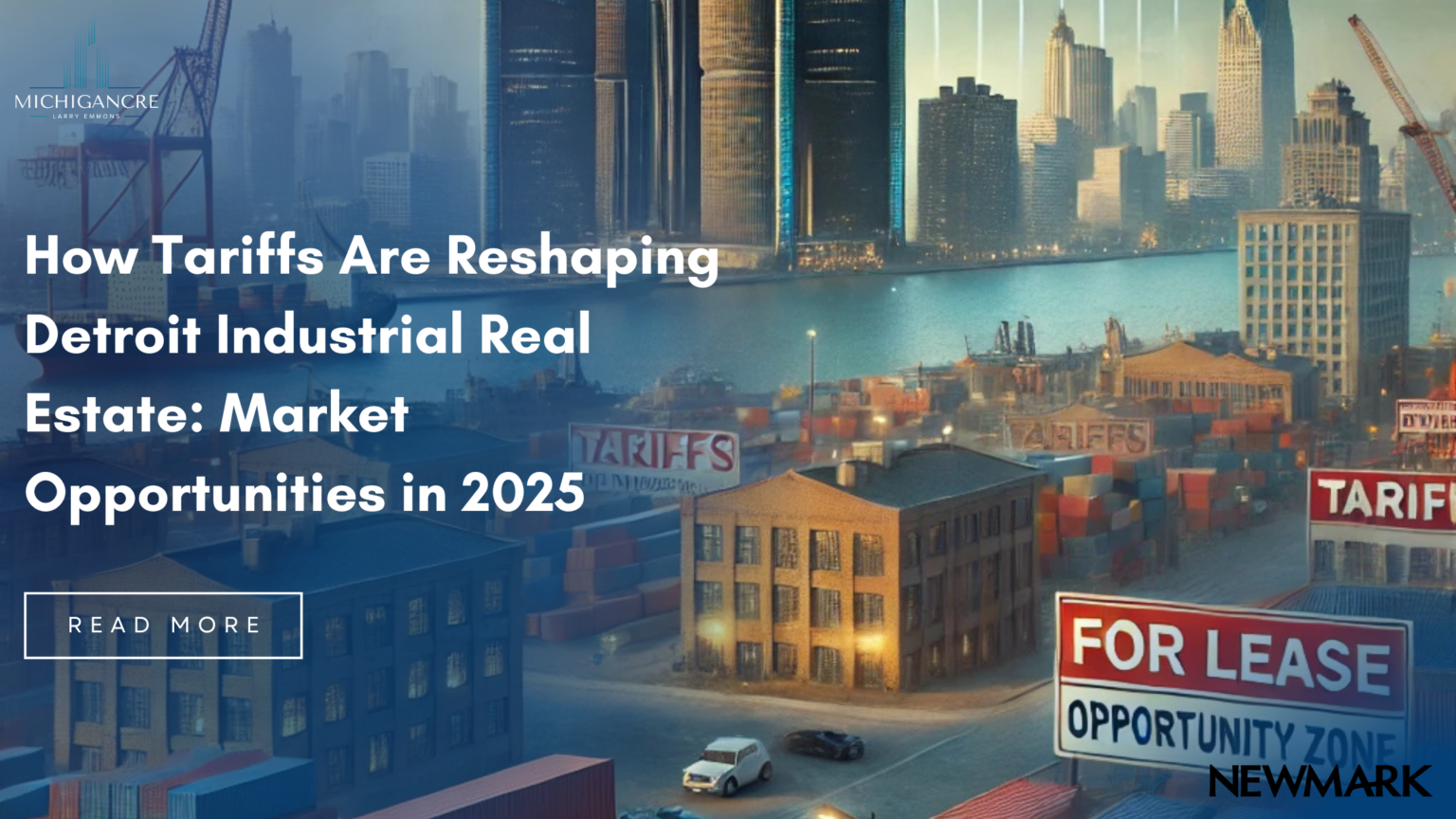Tariffs are reshaping Detroit Industrial Real Estate in significant ways as companies adjust their supply chains and domestic production strategies. These changes are creating new opportunities and challenges for businesses, investors, and developers in Detroit’s industrial sector. In this blog, we’ll explore how tariffs are influencing Detroit’s industrial real estate market, the key trends to watch, and what this means for those looking to invest or expand in the area.
Tariffs Driving Detroit Industrial Real Estate Growth
Tariffs have significantly impacted Detroit’s industrial real estate by boosting domestic demand. Manufacturers are rethinking their supply chains as importing goods from China, Canada, and Mexico becomes more expensive.
While tariffs create challenges, they also offer opportunities for local manufacturers by protecting foreign competition. With its strong manufacturing history, Detroit is benefiting from increased local production needs. These conditions stimulate growth in the industrial real estate sector as companies look for facilities to handle more manufacturing and warehousing activities.
The numbers show this trend clearly – demand is growing for both manufacturing and warehouse facilities across Metro Detroit, with industrial vacancy at a record low of just over 4%.
Automotive Industry Response
Detroit’s automotive industry faces both challenges and opportunities from current tariff policies. Tariffs on steel and aluminum are increasing manufacturing costs for automakers and suppliers.
At the same time, tariffs on imported vehicles and parts have made domestic production more competitive. This has resulted in major investments throughout the region, including Ford’s $700 million expansion of its Rouge Complex in Dearborn and General Motors’ $2.2 billion investment in its Factory Zero (formerly the Detroit-Hamtramck Assembly plant).
Logistics and Warehousing Demand
The combination of increased inventory needs and changing supply chains has created a mini-boom in logistics and warehousing demand in Detroit.
This trend is especially visible in areas near major transportation routes, including properties along I-75, I-94, and I-96. Developers are responding with new warehouse construction, particularly near Detroit Metro Airport, where over 3.0 million square feet is currently being developed.
Construction Costs and Project Challenges
While demand for industrial space may be increasing, tariffs are also raising construction costs, which affects project feasibility and rental rates.
Class A properties continue to command premium rents, while older facilities need significant investment to stay competitive. These increased costs have been particularly challenging for speculative developments and redevelopment projects with thin profit margins.
Canadian Border Advantage
Detroit’s location next to Canada has become increasingly important in the era of tariffs. The USMCA (formerly NAFTA) previously provided tariff exemptions that made cross-border manufacturing and distribution strategies attractive. We’re now seeing manufacturing and warehousing operations being consolidated on the Detroit side.
Future Outlook and Investment Strategies
Looking ahead, Detroit’s industrial real estate market appears well-positioned despite tariff uncertainties. The key drivers of demand—strategic location, skilled workforce, and competitive costs compared to coastal markets—remain strong.
Investors and developers are adjusting their strategies to capitalize on these trends:
- Focus on flexibility: Properties that can accommodate multiple industrial uses are commanding higher values
- Emphasis on technology: Facilities with infrastructure to support automation and advanced manufacturing are in high demand
- Energy efficiency: Rising operational costs are making energy-efficient buildings more attractive
- Last-mile logistics: Properties serving urban delivery needs continue to experience strong demand
Looking to Capitalize on Detroit’s Industrial Real Estate Growth?
With tariffs reshaping the landscape of Detroit’s industrial market, now is the perfect time to take advantage of emerging opportunities. As demand for manufacturing, warehousing, and logistics space grows, Detroit’s industrial real estate market offers substantial potential for investors, developers, and businesses looking to expand.
If you’re ready to explore the best properties and navigate these changes with confidence, reach out to me today. As a seasoned commercial real estate broker with deep expertise in the Detroit market, I can help you find the ideal space for your needs or investment goals. Let’s turn these market trends into your next successful deal!
Contact me now at 248-705-9115 or Larry.Emmons@nmrk.com to get started!
Detroit Industrial Real Estate: Conclusion
Tariffs have created an evolving but generally positive environment for Detroit’s industrial real estate market. While construction costs have increased, the fundamental shifts in manufacturing and distribution strategies are generating substantial demand for industrial space throughout the region.
As tariff policies continue to evolve, Detroit’s industrial real estate sector will likely remain adaptable. The area’s manufacturing expertise, strategic location, and infrastructure investments position it well to benefit from the ongoing restructuring of global supply chains. For investors, developers, and industrial users, Detroit’s market offers significant opportunities despite—and in some cases because of—the new tariff environment.
